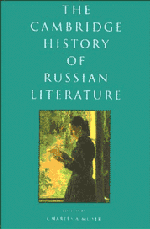Book contents
- Frontmatter
- 1 The literature of old Russia, 988–1730
- 2 The eighteenth century: neoclassicism and the Enlightenment, 1730–90
- 3 The transition to the modern age: sentimentalism and preromanticism, 1790–1820
- 4 The nineteenth century: romanticism, 1820–40
- 5 The nineteenth century: the natural school and its aftermath, 1840–55
- 6 The nineteenth century: the age of realism, 1855–80
- 7 The nineteenth century: between realism and modernism, 1880–95
- 8 Turn of a century: modernism, 1895–1925
- 9 The twentieth century: the era of socialist realism, 1925–53
- 10 The twentieth century: in search of new ways, 1953–80
- 11 Afterword: Russian literature in the 1980s
- Bibliography
1 - The literature of old Russia, 988–1730
Published online by Cambridge University Press: 28 March 2008
- Frontmatter
- 1 The literature of old Russia, 988–1730
- 2 The eighteenth century: neoclassicism and the Enlightenment, 1730–90
- 3 The transition to the modern age: sentimentalism and preromanticism, 1790–1820
- 4 The nineteenth century: romanticism, 1820–40
- 5 The nineteenth century: the natural school and its aftermath, 1840–55
- 6 The nineteenth century: the age of realism, 1855–80
- 7 The nineteenth century: between realism and modernism, 1880–95
- 8 Turn of a century: modernism, 1895–1925
- 9 The twentieth century: the era of socialist realism, 1925–53
- 10 The twentieth century: in search of new ways, 1953–80
- 11 Afterword: Russian literature in the 1980s
- Bibliography
Summary
The story of Russian literature begins with a date of great significance for Russian political and cultural history: the year 988, when the ruler of Kievan Rus officially accepted Christianity as the new faith of the principality. At that point there was no written literature in Rus, but by his action Prince Vladimir laid the foundations of what we now call medieval Russian literature, even though it would not come into real being – so far as we know from what has reached us after the destruction wrought by the Mongol invasion – for some years thereafter. But the eastern Slavs received an alphabet designed by SS. Constantine-Cyril and Methodius, and also fell heir to the rich Byzantine cultural heritage which had been and would be translated from the Greek.
When we speak of “literature” in the old Russian period, however, we must understand it as something quite different from our notions of “literature” in the twentieth century.
In the first place, most old Russian literature was not what we would consider fictional, or at least it presented itself as dealing with fact and reality. In the earliest period one of the leading literary genres was the chronicle (exemplified by the Primary Chronicle) which built upon the achievements of the Byzantine historians. This genre by its very nature claimed to be factual even though it contained some clearly fictional (or at least non-factual) elements. Another leading genre was hagiography, which dealt with biographical accounts of the lives of Russia’s holy men and women: if a saint’s life contained fantastic elements, they were meant to be taken seriously, and not regarded as fiction.
- Type
- Chapter
- Information
- The Cambridge History of Russian Literature , pp. 1 - 44Publisher: Cambridge University PressPrint publication year: 1992



